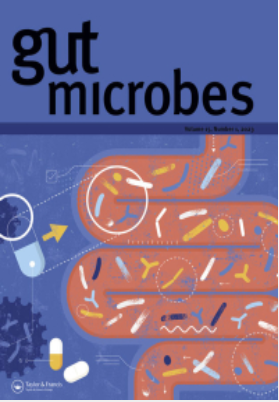源于孢子梭菌的代谢物可保护小鼠免受结肠炎的侵袭。
IF 12.2
1区 医学
Q1 GASTROENTEROLOGY & HEPATOLOGY
引用次数: 0
摘要
肠道微生物群衍生代谢物在维持肠道免疫平衡方面发挥着关键作用。在这里,我们证明了人类共生梭状芽孢杆菌具有特定的代谢指纹,主要包括色氨酸代谢产物吲哚-3-丙酸(IPA)、支链酸(BCFA)异丁酸酯和异戊酸酯以及短链脂肪酸(SCFA)醋酸酯和丙酸酯。用孢子丝菌单殖无菌小鼠(CS小鼠)会影响结肠粘膜免疫细胞表型,包括Il22基因表达上调、转录活跃的结肠丛细胞和Foxp3+调节性T细胞(Tregs)数量增加。在 DSS 诱导的结肠炎中,传统小鼠会出现严重的炎症,并伴有结肠隐窝脱落。而 CS 小鼠则没有这些症状。在常规小鼠而非 CS 小鼠中,结肠的大量 RNAseq 分析显示炎症和 Th17 相关基因特征有所增加。源于孢子芽孢杆菌的IPA通过抑制mTOR活性和改变Th17细胞中核糖体相关途径,减少了IL-17A蛋白的表达。此外,孢子虫产生的 BCFAs 和 SCFAs 还能增强 Tregs 的活性并增加 IL-22 的产生,从而防止结肠炎的发生。总之,我们发现孢子丝菌是一种具有治疗意义的益生菌,可用于治疗炎症性肠病(IBD)患者。本文章由计算机程序翻译,如有差异,请以英文原文为准。
Clostridium sporogenes-derived metabolites protect mice against colonic inflammation.
Gut microbiota-derived metabolites play a pivotal role in the maintenance of intestinal immune homeostasis. Here, we demonstrate that the human commensal Clostridium sporogenes possesses a specific metabolic fingerprint, consisting predominantly of the tryptophan catabolite indole-3-propionic acid (IPA), the branched-chain acids (BCFAs) isobutyrate and isovalerate and the short-chain fatty acids (SCFAs) acetate and propionate. Mono-colonization of germ-free mice with C. sporogenes (CS mice) affected colonic mucosal immune cell phenotypes, including up-regulation of Il22 gene expression, and increased abundance of transcriptionally active colonic tuft cells and Foxp3+ regulatory T cells (Tregs). In DSS-induced colitis, conventional mice suffered severe inflammation accompanied by loss of colonic crypts. These symptoms were absent in CS mice. In conventional, but not CS mice, bulk RNAseq analysis of the colon revealed an increase in inflammatory and Th17-related gene signatures. C. sporogenes-derived IPA reduced IL-17A protein expression by suppressing mTOR activity and by altering ribosome-related pathways in Th17 cells. Additionally, BCFAs and SCFAs generated by C. sporogenes enhanced the activity of Tregs and increased the production of IL-22, which led to protection from colitis. Collectively, we identified C. sporogenes as a therapeutically relevant probiotic bacterium that might be employed in patients with inflammatory bowel disease (IBD).
求助全文
通过发布文献求助,成功后即可免费获取论文全文。
去求助
来源期刊

Gut Microbes
Medicine-Microbiology (medical)
CiteScore
18.20
自引率
3.30%
发文量
196
审稿时长
10 weeks
期刊介绍:
The intestinal microbiota plays a crucial role in human physiology, influencing various aspects of health and disease such as nutrition, obesity, brain function, allergic responses, immunity, inflammatory bowel disease, irritable bowel syndrome, cancer development, cardiac disease, liver disease, and more.
Gut Microbes serves as a platform for showcasing and discussing state-of-the-art research related to the microorganisms present in the intestine. The journal emphasizes mechanistic and cause-and-effect studies. Additionally, it has a counterpart, Gut Microbes Reports, which places a greater focus on emerging topics and comparative and incremental studies.
 求助内容:
求助内容: 应助结果提醒方式:
应助结果提醒方式:


